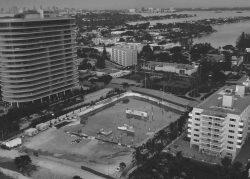The stalking horse bidder offering $120 million to purchase the site of the Surfside condo collapse signed a sales contract, setting in motion a timeline that will lead to an auction of the oceanfront property, as legal claims could reach $1 billion.
Miami-Dade Circuit Court Judge Michael Hanzman said during a hearing on Thursday that he will review a motion to approve the contract at next week’s hearing, at which point the bidder and terms of the contract will be made public. To date, the bidder’s identity has not been disclosed, while several top South Florida developers have said they are not interested in or pursuing a purchase of the property at 8777 Collins Avenue.
The stalking horse bidder set the minimum price for the site on which 98 people died June 24 when a portion of the Champlain Towers South building collapsed. The rest of the building was later brought down in a controlled demolition, and the site has since been cleared and braced.
Additional potential buyers will be able to bid on the site at an auction that is expected to occur between February and March, said receiver Michael Goldberg at the hearing Thursday morning. Attorneys representing unit owners also filed a lawsuit to terminate the condominium, a legal requirement for the entire process to move forward.
Read more



The future of the site has divided some survivors, families of the victims and Surfside residents. A group of victims is advocating for a memorial to be built on the site, which the judge has said will not happen. The proceeds of the site’s sale will go to the unit owners.
Hanzman said the public push for a memorial by victims who are speaking out against the sale is driving down the sale price and scaring off potential bidders.
“We are not trying to devalue the value of the land,” said Vicky Btesh, whose husband, Andres Levine, died in the collapse. She added she believes there still could be a private donor or government entity that would provide fair market value for the land to allow it to remain a memorial. “I do believe we can make this happen,” she said
“I understand that people who make these comments, they are not trying to devalue the land, but they are,” Hanzman responded. “When people talk about developers being greedy … they may not be trying to do harm, but they are doing harm.”
Hanzman also denounced comments made by public officials, including Surfside commissioner Eliana Salzhauer, whom he did not name, who had called a proposed land swap with the town “delusional.”
“These types of incendiary and uninformed comments do nothing but drive the value of this property down,” Hanzman said. “This court is not going to tolerate this any further.”
Goldberg said the stalking horse bidder will have 60 days to complete its due diligence, and has provided a $150,000 non-refundable deposit to the estate for that period of time. During this period, the buyer would be able to walk away from the contract for any reason. Once the contract goes hard, the buyer will have provided a $16 million non-refundable deposit.
Hanzman asked the receiver to tighten the due diligence period if possible.
Attorneys also took the major procedural step to allow the sale of the land by filing a condo declaration termination suit that would discontinue the declaration’s existence in the eyes of the law. Four unit owners filed the lawsuit in Miami-Dade Circuit Court against Goldberg, the Champlain association as well as all unit owners and others with potential claims in the litigation.
This allows potential and existing lienholders on units to be brought into the litigation if they plan to lay a future claim on potential disbursements. Banks with mortgages on units and other potential lienholders would likely be first in line to get payments from disbursements, although they may not be paid in full, as some of the payments could be negotiated down.
The exact manner in which disbursements will be divided among victims is yet to be decided. Hanzman said some would argue that property insurance funds and revenue from the land sale should first be distributed to victims who lost property, with the remainder to those with death and personal injury claims. Others would say the money should be distributed pro rata, he said.
The judge added that he will try to get attorneys to agree on how distributions will be divided, but if they don’t, the decision is in his hands.
“This is a highly unique type of case where some unit owners survived, whereas others have death claims,” Hanzman said at the hearing.
Among the issues is that funds will be insufficient unless additional, solvent defendants are identified as being at fault for the collapse.
By preliminary estimates, claims could easily exceed $1 billion, Hanzman said. Yet, so far roughly $49 million in property and liability insurance has been identified, and the stalking horse bidder set the floor price for the land at $120 million. This means there could be roughly an $800 million gap between available funds and claims, Hanzman said.
The consolidated complaint seeking class action status is so far only against the association, but attorneys are reviewing thousands of documents obtained through subpoenas to determine if others could have been at fault and should be named. The deadline to file a new complaint with additional defendants is Nov. 16.
Ultimately, it is unclear how high a price developers will bid for the site at next year’s auction.
“I hope we get $300 million,” Hanzman said. “I am not putting a cap on it. The market will dictate.”
